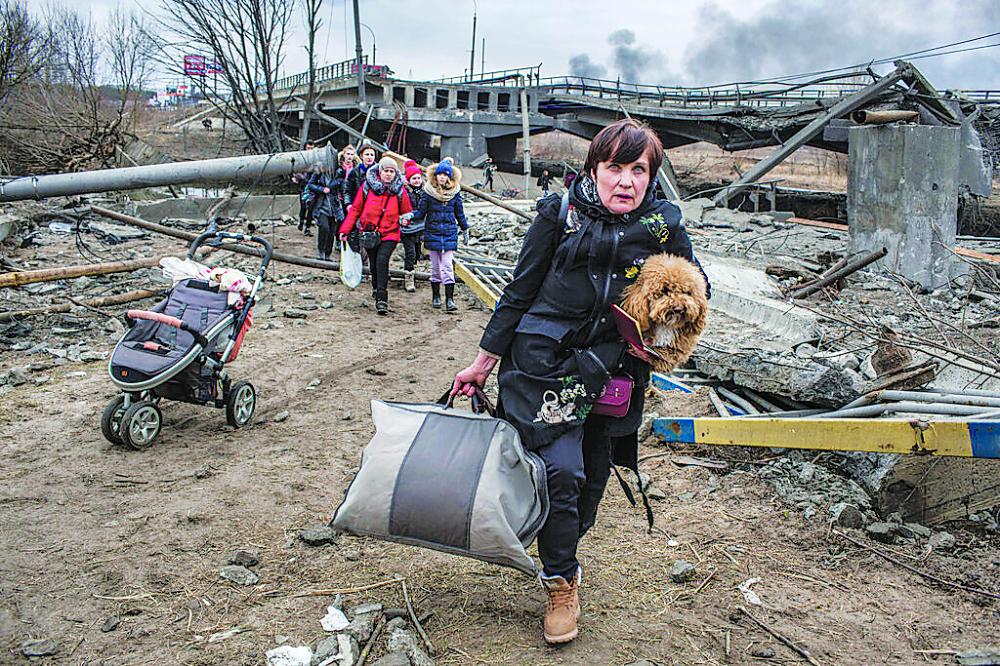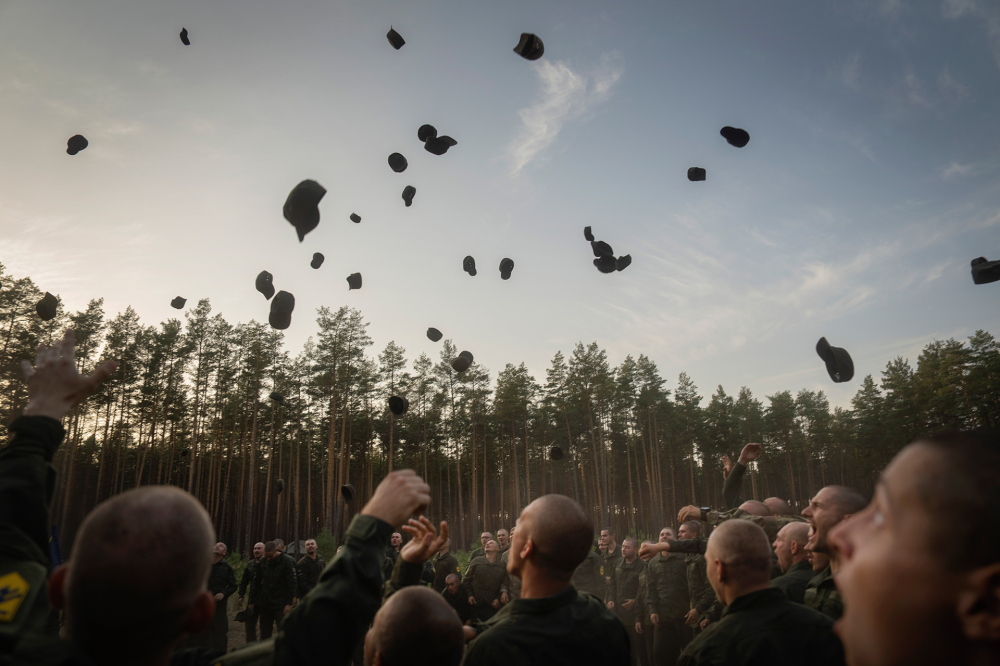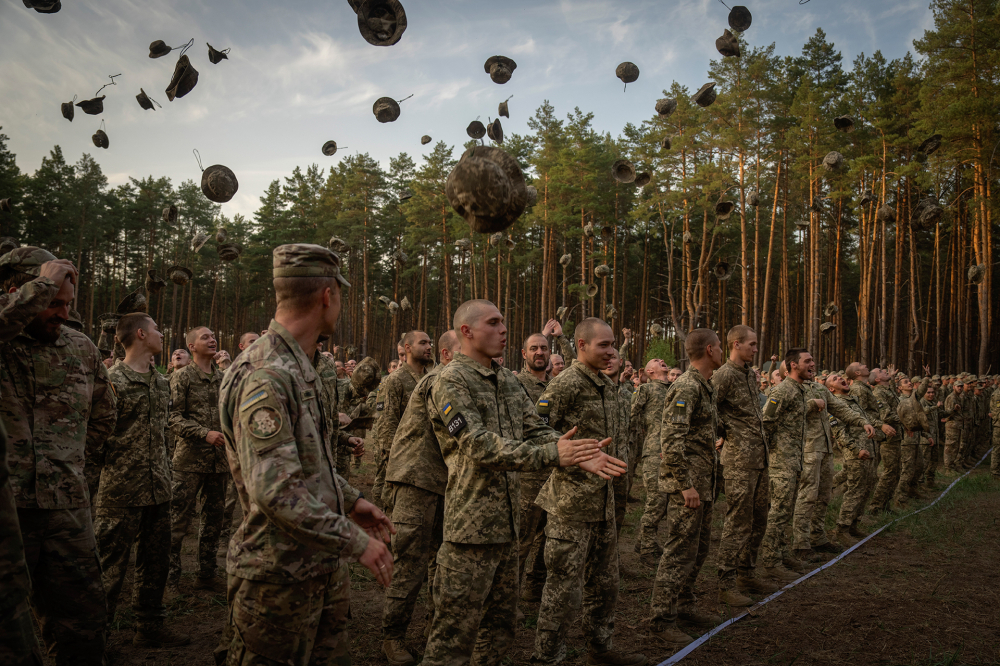Two years of war: Russia unable to win, Ukraine unwilling to lose
We use Google Cloud Translation Services. Google requires we provide the following disclaimer relating to use of this service:
This service may contain translations powered by Google. Google disclaims all warranties related to the translations, expressed or implied, including any warranties of accuracy, reliability, and any implied warranties of merchantability, fitness for a particular purpose, and noninfringement.


Periodic elections come and go in democratic countries. The leadership is selected for a certain period of time through elections. Those who win votes with the hearts of the voters take the leadership of the country, while the losers have no choice but to wait for another election. But the election of Ukraine on March 31, 2019, in which Volodymyr Zelensky won the presidency, is somewhat different in this sense.


"I have tried to make Ukrainians laugh as much as I can in my life. I think it's not just a job, it's a mission," Zelensky said during his presidential swearing-in. "For the next five years, I will do everything so that Ukrainians don't cry." Zelensky will be five years in office on May 20. But the last two years of his tenure, Ukraine is in unprecedented pain. And, people have 'forgotten to laugh'. The reason for this is the war with Russia. After Zelensky was elected president, he forcefully raised the issue of joining the North Atlantic Treaty Organization (NATO) in a way that was unacceptable to Russian President Putin. Finally, on February 24, 2022, Putin launched an invasion of Ukraine. It has been two years since the war between the two countries.
After the Russian attack, a large number of civilians have died in Ukraine and many structures have been destroyed. According to a study by the United Nations, the World Bank, the European Commission and the Ukrainian government, about 5.9 million Ukrainians have left the country, while 37 million have been internally displaced. A large number of military casualties have occurred on both sides. American intelligence officials have stated that at least 120,000 Russian soldiers died and 170,000 were wounded in the war.
Britain's Ministry of Defense says that the number of Russian soldiers who lost their lives is 50,000. On the other side of Ukraine, 70,000 people died and 100,000 were injured. Similarly, some Russian cities have also faced Ukrainian drone attacks. Thousands of foreigners have joined the armies of both countries. Hundreds of them have died. Nepalis are also among those who lost their lives joining the Russian army . Although the government has officially said that 200 Nepalis have joined the Russian army, according to Nepalis in the war zone, that number is much higher. Among them, 13 Nepalis have died and many have been injured. Similarly, 4 Nepalis who joined the Russian army and were deployed in the war zone are under the control of the Ukrainian army.
 Ukraine became independent in a referendum four months before the formal dissolution of the Soviet Union on December 26, 1991. Leonid Kravchuk, leader of the Ukrainian Socialist Soviet Republic, which declared Ukraine independent, became the first president. In the 1994 presidential election, Kravchuk lost to ex-communist leader Leonid Kuchma. He was re-elected in 1999 but the election was rigged.
Ukraine became independent in a referendum four months before the formal dissolution of the Soviet Union on December 26, 1991. Leonid Kravchuk, leader of the Ukrainian Socialist Soviet Republic, which declared Ukraine independent, became the first president. In the 1994 presidential election, Kravchuk lost to ex-communist leader Leonid Kuchma. He was re-elected in 1999 but the election was rigged.
In the two and a half decades since, reports of fraud and irregularities have dominated Ukraine's presidential elections. The "Orange Revolution" began in Ukraine in 2004 with accusations of massive rigging to win the presidential election for pro-Russian Viktor Yanukovych. The movement ended after the Supreme Court ordered re-election, but Viktor Yushchenko won the new election. During the tenure of Yushchenko, who became president with the support of Western countries, relations between Russia and Ukraine remained very bitter. In 2009, Russia cut off gas supplies for a while in protest against the US move to defeat a candidate close to it by inciting protests in Ukraine, causing an energy crisis in Ukraine, as well as in Romania, Hungary and Bulgaria.
However, pro-Russian Viktor Yanukovych was elected president in 2010 in Ukraine, which has close ties with the West. Yanukovych, who has been working to end unemployment and corruption, the main problems in Ukraine, has reached out to the European Union (EU) for trade and investment. "EU-Ukraine Association Agreement" was also prepared for that in 2012. But after he backed out of that deal under Russian pressure, the problem in Ukraine has become more complicated.
which led to renewed protests in Ukraine. Ukrainian President Viktor Yanukovych left the country and went to Russia in 2014 after protests supported by Western countries including the US. The interim government after he fled said it had no plans to join NATO. But in retaliation for the Western coup that overthrew the pro-Russian president, Russia seized the Ukrainian territory of Crimea in March 2014 and ignited a civil war in eastern Ukraine.
Sevastopol in Crimea, where the Ukrainian navy is located, was captured by Russia, and Ukraine became without a navy. On top of that, Ukraine, which has lost almost half of its Black Sea coastline, was alarmed at becoming a landlocked country. Because of this, there was a call to join NATO, even if it was to save Odessa from Russia. After Yanukovych fled, Petro Poroshenko was elected in 2014 elections. Although Yanukovych is pro-Europe, he said he is ready for talks with Russia. During his tenure, he made some reforms in the areas of corruption and transparency in the public sector. In addition, Russian separatist forces were able to withdraw from the Donbass region.
But Poroshenko lost the 2019 election to incumbent President Volodymyr Zelensky after the Panama Papers revealed illegal investments abroad. Comedian Zelenskiy won the election with a pledge to "combat corruption and end the raging conflict in eastern Ukraine." For some time after his accession, the Russian leadership appeared to be in a 'wait and see' situation on the Ukraine issue. But when in January 2021, Zelensky appealed to US President Biden to join Ukraine in NATO. In addition, in February 2021, the Zelenskyi government banned Ukrainian politician and Putin friend Viktor Medvedchuk, taking a new turn in relations with Russia.
 In March and April 2021, the Russian military conducted military exercises along the Ukrainian border as the situation became more complicated. However, the troops were withdrawn after the exercise. But in October of the same year, after Ukraine used the Turkish "Bayraktar TB-2" drone, angry Russia again deployed troops on the Ukrainian border. Meanwhile, in the first week of December 2021, US President Joe Biden attacked Ukraine and threatened to impose economic sanctions on Russia. But in return, on December 17, Russia demanded a comprehensive security proposal, including binding legal guarantees that NATO would not engage in military activity in Eastern Europe and Ukraine. After talks between Russian and American diplomats failed in January 2022, Russia conducted military exercises in Belarus and the Black Sea on February 10.
In March and April 2021, the Russian military conducted military exercises along the Ukrainian border as the situation became more complicated. However, the troops were withdrawn after the exercise. But in October of the same year, after Ukraine used the Turkish "Bayraktar TB-2" drone, angry Russia again deployed troops on the Ukrainian border. Meanwhile, in the first week of December 2021, US President Joe Biden attacked Ukraine and threatened to impose economic sanctions on Russia. But in return, on December 17, Russia demanded a comprehensive security proposal, including binding legal guarantees that NATO would not engage in military activity in Eastern Europe and Ukraine. After talks between Russian and American diplomats failed in January 2022, Russia conducted military exercises in Belarus and the Black Sea on February 10.
Despite that, after the Ukrainian President Zelensky's statement that he will continue his efforts to join NATO, on February 21, Russian President Putin recognized the Donetsk and Luhansk Republics, which separated from Ukraine, and ordered the deployment of Russian forces. On February 22, Germany suspended the Nord Stream 2 gas project and the US and EU announced the first round of sanctions. After Ukrainian separatists asked for Russian help on February 23, the Ukrainian parliament approved a state of emergency declaration, and the next day, on February 24, Russia launched a full-scale attack on Ukraine.
Some analysts point to Russia's attack on Ukraine's Crimea in 2014 as the root of the Russia-Ukraine war. But the seeds of the latest problem were planted about a decade and a half ago. The 20th NATO Summit was held in Bucharest, Romania, from 2 to 4 April 2008. In an interview with American journalist Tucker Carlson two weeks ago, Russian President Putin said that the Ukraine problem started in 2008. During the 2008 NATO summit, Ukraine and Georgia were announced as members of NATO, the US-led military alliance. Although the announcement was made under the pressure of the then US President George W. Bush, no process was mentioned for it.
In particular, the latest tensions between Russia and Ukraine are believed to have started here. The US and Russia had already agreed not to expand NATO, the Cold War-era military alliance. On the contrary, when the American administration proceeded, Russia immediately objected. When the Soviet Union was on the verge of disintegration, the last ruler, Mikhail Gorbachev, was assured by the leaders of Western countries, including the United States, that NATO would not expand eastward and would not engage in activities that would disturb Russia's national security. But it seems that the growing resistance of Western countries including America has made Russia more aggressive.
Putin has been saying that if Ukraine becomes a member of NATO, military activity will increase in the border area of his country and it will pose a threat to national security. He has been demanding the removal of NATO forces and military structures from Eastern Europe and Estonia, Latvia and Lithuania. With Zelensky as president, Ukraine, which has become closer to the Western world, is preparing to join the EU. This has become unbearable for Russian President Putin, who wants Ukraine, like Belarus, to remain under Russia's political, economic and military influence.
 Alexander Lukashenko won the elections held in September 2020 in Belarus. But there were huge street demonstrations in Belarus saying that he was won by rigging the vote count. But with the military support of Russian President Vladimir Putin, Lukashenko was able to quell the protests. Viktor Yanukovych fled to Russia in 2014 after the uprising in Ukraine. Putin planned to invade Ukraine and form a government of his own under his leadership. With the start of the attack, it was also assumed that Russia would form a government of its own in Ukraine within a week/ten days. Ready to become the "Ukrainian Lukashenko", Yanukovych had already arrived in Belarus to prepare for his return to Ukraine. But the strategy that Russia thought would be solved in a few days has not been successful even for two years.
Alexander Lukashenko won the elections held in September 2020 in Belarus. But there were huge street demonstrations in Belarus saying that he was won by rigging the vote count. But with the military support of Russian President Vladimir Putin, Lukashenko was able to quell the protests. Viktor Yanukovych fled to Russia in 2014 after the uprising in Ukraine. Putin planned to invade Ukraine and form a government of his own under his leadership. With the start of the attack, it was also assumed that Russia would form a government of its own in Ukraine within a week/ten days. Ready to become the "Ukrainian Lukashenko", Yanukovych had already arrived in Belarus to prepare for his return to Ukraine. But the strategy that Russia thought would be solved in a few days has not been successful even for two years.
In recent years, NATO members have been providing large amounts of arms and financial support to Ukraine. Its sole purpose is a US-led strategy to encircle Russia. But that does not seem to be an immediate success. Because war means not only soldiers but also a constant supply of weapons. Now Russia has greatly increased the production of cannons. It is buying drones from Iran and missiles from North Korea. Ukraine is dependent on other countries for arms. He is being supported financially by the US and the EU. Addressing the nation after the Russian attack, Zelensky said, "Vladimir Putin has launched a war against Ukraine and the entire democratic world." He wants to destroy our country and all structures. But we know the strength of the Ukrainian people. As Zelensky said, even if the strength of the Ukrainians is not known exactly, being undefeated for two years in the war is a success for him.
But one thing is certain – there is no way Ukraine, dependent on others, can defeat Russia. On the other hand, it is not easy for Russia to win a war by reaching foreign lands. However, the possibility of immediate talks between the two countries is very low. Because, lately, Russia does not seem to be very interested in talks, while Ukraine is not in favor of surrender.
In this situation, the war between the two countries will not end until a new leadership is elected in Ukraine. In particular, Russian President Putin is looking forward to the November presidential election in the United States. He believes that if the next American president withdraws his support for Ukraine and establishes business relations with Russia, the war can be brought to a favorable conclusion. And, the 'Korean model' could be an option for ending the war. That means Western countries will take over the security responsibility of Ukraine and Russia will accept the existence of an independent Ukraine . But convincing Putin for that seems to require a lot of effort. During the two-year war, Ukraine has lost four important territories. Luhansk, Donetsk, Zaporizhia and Kherson, which were taken under control with the attack, have been annexed by Russia through a referendum.
While the war was going on, Ukrainian President Zelensky was even declared 'Time Person of the Year 2022'. Time magazine announced Volodymyr Zelensky as its Person of the Year, saying that "the Russia-Ukraine war has brought hope or terror, connecting the world in a way we haven't seen in decades." As Time said, with the beginning of the Russian attack, Zelensky succeeded in keeping his cabinet, intellectuals, civil society, etc. united against the war and effectively and firmly appearing in various international forums, including the parliament, but he could not bring laughter to the lips of the citizens. Hopefully, the March 31 presidential election in Ukraine will produce such leadership.
(with the help of agencies)
प्रकाशित : फाल्गुन ११, २०८० १०:३५
 २२.१२°C काठमाडौं
२२.१२°C काठमाडौं

















